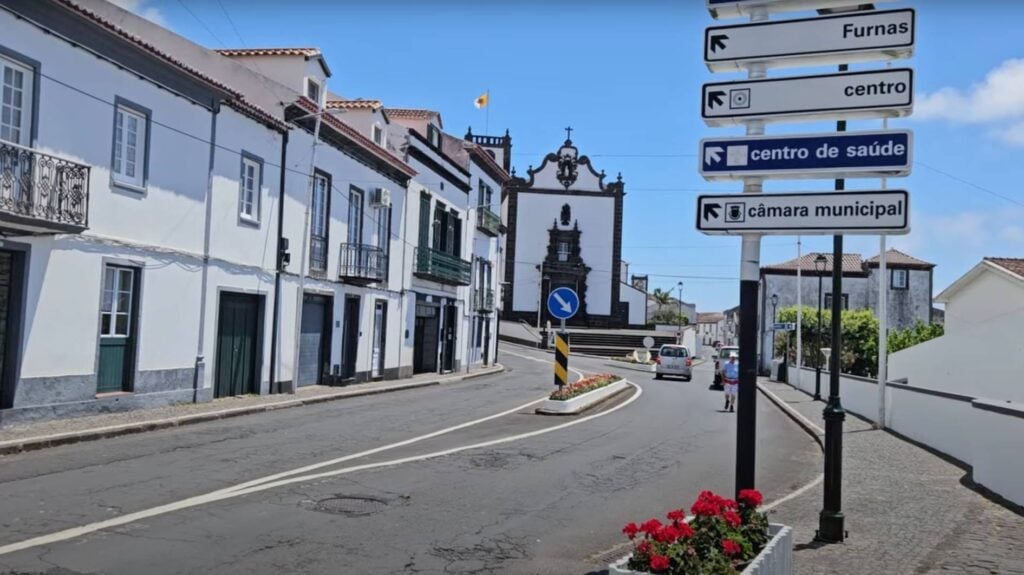Table of Contents
If you’re an EU/EEA/Swiss citizen planning to move to Portugal with a non-EU spouse, partner, or children, you have good news: your family members don’t need to apply for standard Portuguese visas like the D7 or Golden Visa. Instead, they can join you through a streamlined family reunification process called “Article 15.”
However, while this process is simpler in theory, getting an appointment with AIMA (Portugal’s immigration agency) can be challenging (and some choose to go the visa route instead). Here’s everything you need to know.
Who Qualifies?

Eligible family members include:
- Spouse or long-term partner (same sex couples are recognized in Portugal!)
- Dependent minor children (under 18), including adopted children and those of a spouse or partner
- Dependent adult children who are studying in Portugal (typically up until around age 24 and financially dependent on you)
- Dependent parents and parents-in-law (must be medically or financially dependent on you to be considered dependent)
- Minor siblings under legal guardianship or custody
Note: While a spouse and children under 18 are straightforward, other dependents require more proof.
Married vs. Unmarried Partners: Does It Matter?

Yes, significantly. Married couples simply need to provide a marriage certificate, while unmarried partners must prove a “long-term or durable relationship.”
For unmarried couples, this typically means:
- Evidence of living together for 3+ years at the same address
- Shared utility bills, rental contracts, or property ownership documents
- Bank statements (though joint accounts are more convincing than individual accounts with the same address)
Pro tip: Consider obtaining a União de Facto certificate from your local Junta de Freguesia (parish office) before your AIMA appointment. Several applicants report this significantly strengthened their applications when other documents were questioned, although some newcomers to Portugal struggle to get this.
Getting an Atestado De Residência is also recommended.
My partner is an EU citizen but we are not married so proof of our relationship was needed. At my appointment in Coimbra I supplied years of my bank statements and hers listing the same address. However, I was told that they were not sufficient as it was not a joint account so they did take a copy. An old rental contract (for our 1 bed flat in London) was also rejected as apparently only evidence of a property purchase would count as proof of the relationship.
After the meeting we obtained a certificate for our união de facto from the local Junta de Freguesia. I would advise any unmarried couples to do this before their appointment. I sent it to AIMA with the bank statements that had been rejected previously, along with a cover letter asking if they would be sufficient proof of our relationship if considered together. I never received a response but apparently it worked because I have just received my residence card seven months after the appointment.
George
The Application Process: Step by Step
Step 1: The EU Citizen Registers First

You (The EU/EEA/Swiss citizen) need to register at your local câmara municipal (town hall) and obtain your CRUE (Certificado de Registo de Cidadão da União Europeia). This proves you’re legally resident in Portugal. Tip: the easiest way to find your nearest câmara municipal (town hall) is using Google Maps.
However, before you go to the câmara municipal, you’ll need to get a NIF number (either in-person or through an online service), and either rent or buy a property.
Although you don’t always need to show a Portuguese bank account, some officials require this and if you can add your non-EU spouse or partner, this will provide useful documentation for them. It’s also a good idea to add the non-EU spouse to the lease or property deeds, if you can.
Documents Required to obtain the CRUE:
While town halls should only ever ask for ID, proof of address, and proof of financial means, the following documents are typically asked for:
- ID (e.g. passport or European ID card)
- Proof of address
- For purchased property (deeds to the property, mortgage statement)
- For rented property: Lease registered with Finanças (12 months or more is always best). Some locations accept an Airbnb booking, but many do not.
- Others: NIF document, utility bill
- Three months of bank statements
- NIF (Número de Identificação Fiscal)
- Fee (around €15)
- A statement confirming that you have the necessary financial means to support yourself (e.g. pension or savings), are working, or are a student (document provided by câmara).
As there is no set amount for how much income an EU/EEA/Swiss citizen needs to have to live in Portugal, the following table is helpful.
Single Applicant |
Spouse or Partner |
Each Dependent Child |
|
|---|---|---|---|
Minimum monthly income (based on Portuguese minimum wage in 2025) |
€870 per month |
+50% |
+30% |
Savings |
↑ X 12 |
↑ X 12 |
↑ X 12 |
These documents may also be asked for:
- Private health insurance (normally only required if your country asks the same of Portuguese citizens)
- Proof you don’t owe any money to the Portuguese social security department (Declaração da Segurança Social com os Descontos Efetuados)
- A document from your local Junta de Freguesia, signed by two witnesses which confirms you live where you do (Atestado De Residência)
The 90-day Rule
Normally, you can’t do this until you’ve been in Portugal for 90 days. However, immigration lawyer Sandra Gomes Pinto recommends trying to register before the 90-day tourist visa period ends if possible. Some councils allow this, some don’t—but if yours does, it gives you more time to secure the AIMA appointment for your family member.
Now, typically the family members will have entered Portugal at the same time as the EU/EEA/Swiss citizen. If the EU/EEA/Swiss citizen has had to wait 90 days before they can register for their CRUE, this technically means all the non-EU/EEA/Swiss family members are technically overstaying their Schengen Visa.
However, according to Sandra Gomes Pinto, “As long as you’ve started the process of family reunification and can show you’ve been trying to contact AIMA to arrange an appointment, you would be able to defend yourself.”
Step 2: Book the AIMA Appointment (The Hardest Part)

This is where the process gets frustrating. Getting an Article 15 appointment with AIMA requires enormous patience.
Two options for booking:
Option A: Call AIMA directly on (+351) 217 115 000
- Be prepared to call hundreds of times—literally (some people use redial apps to try to get through)
- Don’t use the phrase “family reunification” when calling, as staff may confuse this with the D6 visa (for families where no one holds EU citizenship)
- Some people report calling for weeks and even months before getting through
Note: emailing is an option, and it can be good to show a paper trail that you have been trying to email. However, the advice in Portugal is always to phone rather than email in most cases.
Tracking appointment availability: Follow AIMA Facebook groups to get notified when new Article 15 appointment batches are released.
Option B: Use a CLAIM office
Some Portugalist readers report this as being easier as CLAIM will register you in the system and schedule your AIMA appointment. While this can still take months, it’s reportedly less stressful than calling AIMA directly.
Step 3: Attend Your AIMA Appointment

Attend your appointment on the scheduled date (with your EU/EEA/Swiss family member). Don’t show up without an appointment—you won’t be seen.
Also, don’t be surprised if you get offered an appointment in a different location to where you live. It’s not uncommon for people to be offered appointments on the other side of the country. Our recommendation: just take it. This isn’t the time to be picky!
Required Documents
Now here’s the tricky part. As with many processes in Portugal, the exact documents required depends on who’s interviewing you and this particular process seems to be less uniform than most others.
The advice in these situations is to over-prepare. You might not need all of these documents, but have them with you just in case.
For the non-EU family member:
- Valid passport (original, not photocopies)
- Proof of family relationship (e.g., marriage certificate, birth certificate, or união de facto)
- Application form (available at AIMA or can be completed in advance)
- NIF (tax identification number)
- Proof of address (ideally a name on the lease or deeds). Having a name on a utility bill or an Atestado De Residência is also a good idea.
- Bank statements and account printout (ideally from a joint Portuguese bank account, although getting this may not be possible until you obtain residency).
Tip: Opening a joint bank account in person, in Portugal is tricky when one person is a resident and the other isn’t. This (along with the NIF), is something you can arrange before moving to Portugal through services like Anchorless or E-Residence (see comparison here).
For the EU citizen (your sponsor):
- Valid passport or European ID card (or cartão de cidadão if the family member is Portuguese)
- CRUE (residence certificate)
- TOR or Termo de Responsabilidade form (available at AIMA or can be completed in advance)
For dependent children: Proof they’re under 18 or financially in full-time education and financially dependent on you (if under 24 or so)
For dependent parents/grandparents: Proof of dependency (either financial or medical)
Special Document Requirements
Marriage certificates from countries besides Portugal
- Typically need to be 6 months old or less (this isn’t always asked for, but better safe than sorry).
- EU: EU marriage certificates need translation but not apostille
- Non-EU: Non-EU certificates typically need both translation and apostille. They may also need to be registered in the country of the EU citizen.
- Translations and apostilles must be less than 6 months old
- If you are married to a Portuguese citizen, register your marriage through your country’s consulate in Portugal to avoid apostille requirements
For unmarried partners:
- Obtain a união de facto certificate from your local Junta de Freguesia
- Bring evidence of cohabitation (rental contracts, property deeds, shared bills spanning 3+ years)
At the Appointment
- Pay the fee (around €33). It’s best to bring cash, but most places will take card (but may not take AMEX).
- Have your photograph and fingerprints taken (known as biometrics)
- Receive a temporary residence permit printout (recibo comprovativo de pedido de residência) valid until your card arrives.
- This document should allow you to get a número de utente, allowing you to register for the public health service (not guaranteed, but worth trying).
The Alternative: Applying for a Standard Visa Instead
Given that family members of EU citizens can use the Article 15 process, why do some choose to apply for visas like the D7 or Digital Nomad Visa instead—often paying several thousand euros per person in legal fees?
The answer: AIMA’s massive backlog.
Some people wait months for an Article 15 appointment. Others wait years. And even getting through to AIMA by phone or email can feel impossible. While this situation should be improving, the reality is that the backlog remains severe.
The Problem with Being in Limbo
Here’s why the wait is such a serious issue: your family member ends up stuck in legal limbo. They’re sort of legal—they’ve entered Portugal on a tourist visa and started the family reunification process—but they don’t have proper paperwork to prove it. Can they leave Portugal during this time? It’s hard to get a concrete answer from lawyers, AIMA, anyone.
This creates real problems:
- Travel restrictions: Many immigration lawyers advise against leaving Portugal until you have your residence permit. If you leave and try to re-enter, border officers may question your status.
- Work complications: While you technically have the right to work once you have your temporary permit, proving this during the waiting period can be difficult.
- Family emergencies: If a family emergency arises in your home country, you may not be able to travel freely. Or if you do, you will always worry that you’ll have issues trying to re-enter Portugal.
- Banking and services: Some services require proof of legal residence, which is difficult to provide while waiting.
- General uncertainty: Not knowing when (or if) you’ll get your appointment creates enormous stress.
Why the Visa Route Can Be Faster
When you apply for a visa like the D7 or Digital Nomad Visa through a Portuguese consulate in your home country, you are typically (though not always) granted an AIMA appointment automatically as part of the visa process.
The trade-off:
This route costs significantly more—often several thousand euros per person in legal fees, plus visa application fees. You don’t have to use a lawyer for a residency visa, but it’s typically recommended.
Another downside: temporary residency for visas (like the D7 or Digital Nomad Visa) is typically granted for 2 years and renewable for 3. In comparison, dependents are normally granted the same amount of time as the EU/EEA/Swiss family members (typically 5 years) so there’s less need for renewals.
The Article 15 route allows you to move to Portugal and then deal with everything once you get here. That’s a plus if you don’t need to leave. Applying for a visa like the D7 or Digital Nomad Visa, on the other hand, requires you to get your consulate appointment and visa approved before moving to Portugal. This is definitely more work, and it can be hard to get the timing right due to the lack of consular or VFS appointments.
Which Route Is Right for You?
Step 1: Consult an immigration lawyer
Only an immigration lawyer actively handling these cases can tell you:
- How long Article 15 appointments are currently taking at your local AIMA office
- How quickly appointments for specific visas are being granted at the particular consulate you’d apply through
This second point is crucial. Wait times vary dramatically by consulate and visa type. Some consulates are processing D7 visas quickly; others have long backlogs. Some are handling Digital Nomad Visas faster than D7s. There’s absolutely no way to know this yourself—it changes constantly and varies by location. An immigration lawyer can advise.
Step 2: Compare the options
Once you have current wait times, you can make an informed decision:
- Choose Article 15 if: Wait times are reasonable (a few months), you can afford to wait in Portugal, you don’t need to travel urgently, and you want to save on legal fees.
- Choose the visa route if: Article 15 wait times are extremely long (6+ months to years), you need to work immediately, you have travel requirements, or the certainty and legal clarity are worth the extra cost.
Alternatively, do the “Article 15” route but keep some savings aside to take AIMA to court.
This, unfortunately, has become a common procedure to get an appointment and is recommended by an increasing number of lawyers. It typically costs between €1,000 and €1,500, and so is slightly cheaper than the visa option where fees typically start at around €1,500-€2,000 but can cost around €3,000 or more.
Step 3: Act quickly
Whichever route you choose, start the process as soon as possible. Wait times can increase, and it’s better to be in the queue early.
The Bottom Line
Bringing non-EU family members to Portugal as an EU/EEA/Swiss citizen is theoretically straightforward through the Article 15 family reunification process. Your spouse, partner, and dependent children have the legal right to join you without needing standard immigration visas—and once they have their residence permits, they enjoy full rights to work, access healthcare, attend school, and eventually apply for permanent residence and Portuguese citizenship after five years.
However, the reality is more complicated. AIMA’s severe backlogs mean that what should be a simple process can stretch from months to years. The uncertainty, legal limbo, and inability to travel freely during this waiting period causes genuine hardship for many families.
If you’re planning this move, here’s what to do:
- Start early. Begin researching and preparing documents before you arrive in Portugal. The sooner you’re in the queue, the better.
- Consult an immigration lawyer. They can provide current, location-specific information about Article 15 wait times versus visa processing times at your relevant consulate. This isn’t generic advice you can Google—it changes constantly and varies by office.
- Be prepared with multiple strategies. Have documents ready for the Article 15 route, but also understand your visa alternatives and the legal action option. Keep savings set aside in case you need to pivot to a different approach.
- For unmarried couples: Get your união de facto certificate early. Don’t wait until documents are rejected at your appointment.
- Join community groups. AIMA-focused Facebook groups and expat forums provide real-time information about appointment availability and current experiences.
- Stay persistent. The process is frustrating, but most families do eventually succeed. Whether through Article 15, a standard visa route, or legal action, there are multiple paths to bringing your family together in Portugal.
Despite the administrative challenges, thousands of families navigate this process successfully each year. With realistic expectations, proper preparation, and professional guidance, you can too.


Comments are closed.